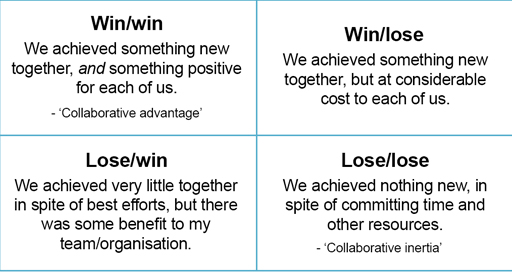3.2 Leadership for win/win outcomes
Win/win outcomes are hard to achieve from collaboration, even when leaders engage in activities that support collaboration - e.g. build trust; develop personal relationships; create a common vision and put people at the centre of the collaboration strategy. Even so, as a leadership strategy, collaboration holds huge potential for delivering something that individuals and organisations struggle to achieve alone.
In the next activity, you will explore collaborative leadership strategies for positive-sum outcomes.
Activity 8 Achieving win/win outcomes
Think about a recent time in which you, your team, or organisation collaborated with another individual, team, or organisation to achieve something new. Your example could come from your work or study experiences or from family life or your leisure time.
For example, two community groups might collaborate to share the rental on a new building, so both improve the environment in which they operate. Teams from different organisations might partner in a bidding process in an attempt to develop a new project and increase resources for them both. Organisations might agree to share back-office functions in order to reduce overheads.
Select in which of the boxes below you would position the outcomes of the example of collaboration that you have chosen.
Feedback
A key challenge for leadership of teams and organisations is to identify strategies that increase the likelihood of achieving outcomes in the positive-sum or win/win box. You will reflect on possible strategies next.
With the advantage of hindsight, what kind of leadership practices might have helped to push the outcomes into the win/win box, or, if they are already in the win/win box, what practices might have increased the wins for all partners? Tick all of those that you consider might have made a difference. You can also add practices of your own to this list in the blank boxes.
Feedback
It is not at all easy to predict which leadership practices lead to win/win outcomes from collaboration, in fact, leaders will adapt a different style and relevant leadership practices based on the situation they experience.
For example, it isn’t automatically true that listening more and shouting less will achieve better outcomes as there is sometimes a need for dissent and confrontation. However, it is difficult to achieve positive outcomes through collaboration without giving attention to growing and nurturing the relationships between collaboration partners.
Collaboration by no means leads to automatic win/win outcomes. For example, some years ago, Carol, part of the Business School at The Open University, was part of an interagency team developing family support programmes and activities in a locality where the data showed that children were achieving less than their peers in adjoining localities. All of the team members were middle managers with heavy responsibilities. Senior managers imposed high targets and introduced a process of performance management and accountability by which the team was to achieve those targets. After the initial pilot period, Carol and the team held a launch event where they shared their accountability framework with senior managers and colleagues, and showed video evidence to demonstrate how families valued the interventions that had been set up. To the team's immense relief, the event went well, and senior managers were positive about what had been achieved through the process they had prescribed.
However, those managers were unaware that Carol and the team had in fact by-passed the prescribed performance management process, or at least moulded it to meet their own ends. They were able to do this because they had a history of working together, were able to speak honestly with one another, and spent time on building the relationships between group members in a context where they recognised that they each felt under enormous pressure to perform. They drank lots of coffee together, and got to know each other better over lunch, whilst also developing a shared plan of action. In other words, Carol and the team focused on relationships and on achieving outcomes, and on this occasion were able to develop both – a win/win solution all round.
Despite this example, there are other occasions when, in spite of best endeavours, working collaboratively means negotiating around tricky relationships, and being prepared for relationship breakdowns in order to achieve the aims of the organisation – possibly at a cost to your partners. In these difficult contexts, the best outcome would be that the organisation would ‘win’ and the partners would not lose too much in the process.


